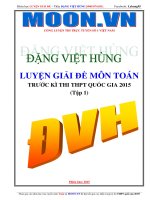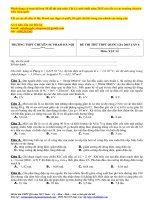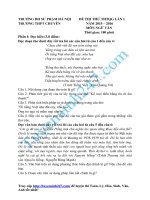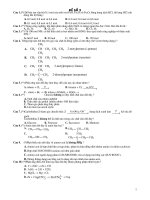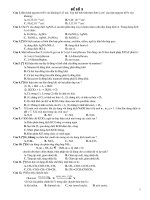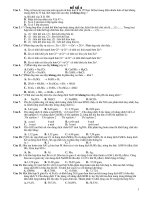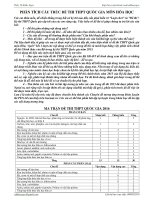De Thi THPTQG
Bạn đang xem bản rút gọn của tài liệu. Xem và tải ngay bản đầy đủ của tài liệu tại đây (140.59 KB, 8 trang )
Mark the letter A, B, C, or D on your answer sheet to indicate the word that differs from the other three in the
position of primary stress in each of the following questions.
Question 1. A. athlete
B. argue
C. injure
D. eject
Question 2. A. tsunami B. medical
C. agency
D. natural
Mark the letter A, B, C, or D on your answer sheet to indicate the word whose underlined part differs from the
other three in pronunciation in each of the following questions.
Question 3. A. famines B. adopts
C. staffs
D. epidemics
Question 4. A. invest
B. sector
C. knowledge
D. success
Mark the letter A, B, C, or D on your answer sheet to indicate the correct answer to each of the following
questions.
Question 5. ____interested in that subject, I would try to learn more about it.
A. Were I
B. If I am
C. Should I
D. I was
Question 6. By the time I recovered from the shock, he ___ round the corner.
A. has disappeared
B. disappeared
C. had disappeared
D. disappears
Question 7. I enjoy ____ busy. I don’t like it when there is nothing ____.
A. being/ to do
B. to do/ being
C. to be/ to do
D. being/doing
Question 8. Nobody was injured in the accident, __?
A. was he
B. wasn’t he
C. were they
D. weren’t they
Question 9. You ___ Tom yesterday. He’s been away on business for a week now.
A. mustn’t have seen
B. could not have seen C. may have not seen D. can’t have seen
Question 10. Linda insisted that the newly- born baby __ after her husband’s father.
A. must be named
B. could be named
C. be named
D. ought to be named
Question 11. Some people say that in the future the whole world will experience a period of ___ depression.
A. economics
B. economic
C. economical
D. economy
Question 12. After a short holiday, he___ himself once more to his studies.
A applied
B. converted
C. engaged
D. exerted
Question 13. Is he really___ to judge a brass band contest?
A. competent
B. skillful
C. capable
D. efficient
Question 14. We are having a ___ party next week. Would you like to join us?
A. house moving
B. housewarming
C. homecoming
D. new housing
Question 15. You can’t lose weight just by taking exercises, ___, I don’t think so.
A. at last
B. at once
C. at any rate
D. at a time
Question 16. Mr. Green is on the line, shall I ___ or ask him to ring back?
A. put him off
B. put him down
C. put him on
D. put him through
Mark the letter A, B, C, or D on your answer sheet to indicate the word(s) CLOSEST in meaning to the
underlined word(s) in each of the following questions.
Question 17. A revolution in women's fashion during the second half of the twentieth century made trousers
acceptable for almost all activities.
A. available
B. permissible
C. attractive
D. ideal
Question 18. The treaty explains the terms of the agreement to reduce nuclear arms.
A. sets out
B. puts out
C. turns out
D. cuts out
Mark the letter A, B, C, or D on your answer sheet to indicate the word(s) OPPOSITE in meaning to the
underlined word(s) in each of the following questions.
Question 19. His career advancement was slow and he did not gain any promotion until he was 40, when he won
the position of the company’s Chief Executive.
A. progress
B. elevation
C. decrease
D. rise
Question 20. This is new washing machine is not a patch on our old one. These clothes are still dirty.
A. to be expensive
B. to be strange
C. to be broken
D. to be better
Mark the letter A, B, C, or D on your answer sheet to indicate the sentence that best completes each of the
following exchanges.
Question 21. Jones: “It seems to me that the summer is nice here.”
– Tam: “_____. It’s really lovely.”
A. You’re exactly right B. You’re dead wrong C. I couldn’t agree less D. You could be right
Question 22. Jane: You’re a great dancer. I wish I could do half as well as you.
- Mary : _______ I’m an awful dancer!
A. You’re too kind.
B. That’s a nice compliment!
C. You’ve got to be kidding!
D. Oh, thank you very much.
Read the following passage and mark the letter A, B, C, or D on your answer sheet to indicate the correct word
or phrase that best fits each of the numbered blanks from 23 to 27.
Some time ago, scientists began experiments to find out (23)______ it would be possible to set up a “village” under
the sea. A special room was built and lowered (24)______ the water of Port Sudan in the Red Sea. For 29 days, five
men lived at a depth of 40 feet. At a (25)______ lower level, another two divers stayed for a week in a smaller
“house”. On returning to the surface, the men said that they had experienced no difficulty in breathing and had
(26)______ many interesting scientific observations. The captain of the party, Commander Cousteau, spoke of the
possibility of (27)______ the seabed. He said that some permanent stations were to be set up under the sea, and
some undersea farms would provide food for the growing population of the world.
Question 23. A. which
B. what
C. how
D. whether
Question 24. A. underneath B. into
C. down
D. below
Question 25. A. any
B. more
C. much
D. some
Question 26. A. made
B. exercised
C. caught
D. done
Question 27. A. implanting B. transplanting
C. growing
D. cultivating
Read the following passage and mark the letter A, B, C, or D on your answer sheet to indicate the correct
answer to each of the questions from 28 to 35.
Very few people in the modern world obtain their food supply by hunting and gathering in the natural
environment surrounding their homes. This method of harvesting from nature’s provision is the oldest known
subsistence strategy and has been practiced for at least the last two million years. It was, indeed, the only way to
obtain food until rudimentary farming and the domestication of wild animals were introduced about 10,000 years
ago.
Because hunter-gatherers have fared poorly in comparison with their agricultural cousins, their numbers have
dwindled, and they have been forced to live in marginal environments, such as deserts and arctic wastelands. In
higher latitudes, the shorter growing seasons have restricted the availability of plant life. Such conditions have
caused a greater dependence on hunting, and on fishing along the coasts and waterways. The abundance of
vegetation in the lower latitudes of the tropics, on the other hand, has provided a greater opportunity for gathering a
variety of plants. In short, the environmental differences have restricted the diet and have limited possibilities for
the development of subsistence societies.
Contemporary hunter-gatherers may help us understand our prehistoric ancestors. We know from the
observation of modern hunter-gatherers in both Africa and Alaska that a society based on hunting and gathering
must be very mobile. While the entire community camps in a central location, a smaller party harvests the food
within a reasonable distance from the camp. When the food in the area has become exhausted, the community
moves on to exploit another site. We also notice seasonal migration patterns evolving for most hunter-gatherers,
along with a strict division of labor between the sexes. These patterns of behavior may be similar to those practiced
by mankind during the Paleolithic Period.
Question 28. The word “domestication” in the first paragraph mostly means ______.
A. hatching and raising new species of wild animals in the home
B. adapting animals to suit a new working environment
C. teaching animals to do a particular job or activity in the home
D. making wild animals used to living with and working for humans
Question 29. According to the passage, subsistence societies depend mainly on ______.
A. agricultural products
B. hunter-gatherers’ tools
C. nature’s provision
D. farming methods
Question 30. In the lower latitudes of the tropics, hunter-gatherers ______.
A. have better food gathering from nature
B. can free themselves from hunting
C. harvest shorter seasonal crops
D. live along the coasts and waterways for fishing
Question 31. According to the passage, studies of contemporary subsistence societies can provide a___.
A. further understanding of prehistoric times
B. broader vision of prehistoric natural environments
C. further understanding of modern subsistence societies
D. deeper insight into the dry-land farming
Question 32. The word “conditions” in the second paragraph refers to ______.
A. the environments where it is not favorable for vegetation to grow
B. the situations in which hunter-gatherers hardly find anything to eat
C. the places where plenty of animals and fish can be found
D. the situations in which hunter-gatherers can grow some crops
Question 33. According to the passage, which of the following is NOT mentioned?
A. The number of hunter-gatherers decreases where farming is convenient.
B. Hunting or fishing develops where there are no or short growing seasons.
C. Harvesting from the natural environment had existed long before farming was taken up.
D. The environmental differences produce no effect on subsistence societies.
Question 34. According to the author, most contemporary and prehistoric hunter-gatherers share_____.
A. only the way of duty division
B. some restricted daily rules
C. some methods of production
D. some patterns of behavior
Question 35. Which of the following would serve as the best title of the passage?
A. Hunter-gatherers: Always on the Move
B. Hunter-gatherers and Subsistence Societies
C. Evolution of Humans’ Farming Methods D. A Brief History of Subsistence Farmi
Read the following passage and mark the letter A, B, C, or D on your answer sheet to indicate the correct
answer to each of the questions from 36 to 42.
Probably the most famous film commenting on the twentieth-century technology is Modern Times, made in
1936. Charlie Chaplin was motivated to make the film by a reporter who, while interviewing him, happened to
describe the working conditions in industrial Detroit. Chaplin was told that healthy young farm boys were lured to
the city to work on automotive assembly lines. Within four or five years, these young men’s health was destroyed
by the stress of work in the factories.
The film opens with a shot of a mass of sheep making their way down a crowded ramp.
Abruptly, the film shifts to a scene of factory workers jostling one another on their way to a factory. However, the
rather bitter note of criticism in the implied comparison is not sustained. It is replaced by a gentle note of satire.
Chaplin prefers to entertain rather than lecture.
Scenes of factory interiors account for only about one-third of Modern Times, but they contain some of the most
pointed social commentary as well as the most comic situations. No one who has seen the film can ever forget
Chaplin vainly trying to keep pace with the fast-moving conveyor belt, almost losing his mind in the process.
Another popular scene involves an automatic feeding machine brought to the assembly line so that workers need
not interrupt their labor to eat. The feeding machine malfunctions, hurling food at Chaplin, who is strapped in his
position on the assembly line and cannot escape. This serves to illustrate people’s utter helplessness in the face of
machines that are meant to serve their basic needs.
Clearly, Modern Times has its faults, but it remains the best film treating technology within a social context. It does
not offer a radical social message, but it does accurately reflect the sentiment of many who feel they are victims of
an over-mechanized world.
Question 36. According to the passage, Chaplin got the idea for Modern Times from ______.
A. a movie
B. a conversation
C. a newspaper
D. fieldwork
Question 37. The young farm boys went to the city because they were ______.
A. promised better accommodation
B. driven out of their sheep farm
C. attracted by the prospect of a better life
D. forced to leave their sheep farm
Question 38. The phrase “jostling one another” in the third paragraph is closest in meaning to “______”.
A. jogging side by side
B. pushing one another
C. hurrying up together
D. running against each other
Question 39. According to the passage, the opening scene of the film is intended ______.
A. to reveal the situation of the factory workers B. to introduce the main characters of the film
C. to produce a tacit association
D. to give the setting for the entire plot later
Question 40. The word “vainly” in the fourth paragraph is closest in meaning to “______”.
A. recklessly
B. carelessly
C. hopelessly
D. effortlessly
Question 41. According to the author, about two-thirds of Modern Times ______.
A. entertains the audience most
B. is rather discouraging
C. was shot outside a factory
D. is more critical than the rest
Question 42. The author refers to all of the following notions to describe Modern Times EXCEPT “______”.
A. satire
B. entertainment
C. criticism
D. revolution
Mark the letter A, B, C, or D on your answer sheet to indicate the underlined part that needs correction in each
of the following questions
Question 43. Ancient people used pots for cooking, storing food, and carry things from place to place.
A
B
C
D
Question 44. Scuba diving is usually carried out in the ocean in that people can explore the underwater world.
A
B
C
D
Question 45. The amounts of oxygen and nitrogen in the air almost always remain stable, but the amount of
A
B
C
water vapor vary considerably.
D
Mark the letter A, B, C, or D on your answer sheet to indicate the sentence that is closest in meaning to each of
the following questions.
Question 46. I’m not in the habit of staying up late.
A. I used to stay up late
B. I am not used to staying up late
C. I stayed up late, which is not in the habit
D. I didn’t use to stay up late.
Question 47. “You’d better apologize for being so rude,” said my friend.
A. My friend advised me to apologize for being so rude.
B. My friend offered me to apologize for being so rude.
C. My friend warned me to apologize for being so rude.
D. My friend suggested me apologizing for being so rude.
Question 48. I wasn’t a bit surprised to hear that Kate had failed her driving test.
A. That Kate had failed in her driving test surprised me a bit.
B. I was surprised that Kate had passed her driving test.
C. It came as no surprise to me to hear that Kate hadn’t passed her driving test.
D. That Kate failed her driving test made her a bit surprised.
Mark the letter A, B, C, or D on your answer sheet to indicate the sentence that best combines each pair of
sentences in the following questions.
Question 49. _________that few building were left standing in the town.
A. Such was the strength of the earthquake
B. So strong the earthquake was
C. Such the strength of the earthquake was
D. So was the strength of the earthquake
Question 50. No sooner had Alice registered for the course than she received the scholarship.
A. Alice registered for the course soon after receiving the scholarship.
B. Rather than receive the scholarship, Alice registered for the course.
C. As soon as Alice registered for the course, she received the scholarship.
D. Registering for the course helped Alice receive the scholarship.
Mark the letter A, B, C, or D on your answer sheet to indicate the word that differs from the other three in the
position of primary stress in each of the following questions.
Question 01.
A. occur
B. prefer
C. apply
D. surface
Question 02.
A. dramatic
B. employee
C. musician
D. entertain
Mark the letter A, B, C, or D on your answer sheet to indicate the word whose underlined part differs from the
other three in pronunciation in each of the following questions.
Question 03.
A. extended
B. skipped
C. looked
D. watched
Question 04.
A. suggest
B. support
C. summer
D. survive
Mark the letter A, B, C, or D on your answer sheet to indicate the most suitable response to
complete each of the following exchanges.
Question 05. Peter and Mary are friends. They have just finished lunch in a restaurant.
Mary. The food is great. I'll get the bill.
Peter. _________.
A. Yes, speak to you soon
B. No, this is on me.
C. I'm afraid he is not here.
D. Don't mention it.
Question 06. Sue is phoning Mr. Black but his secretary tells her that he is on vacation.
Ann. May I leave a message for Mr. Black, please?
Secretary. ___________.
A. He is taking a message now.
B. Yes, I'll make sure he gets it.
C. I'm afraid he is not here.
D. No, you can't tell him.
Mark the letter A, B, C, or D on your answer sheet to indicate the word(s) OPPOSITE in meaning to the
underlined word(s) in each of the following questions.
Question 07. Most of the guests at the dinner party chose to dress elegantly, but one man wore jeans and a T-shirt; he
was later identified as a high school teacher.
A. unsophisticatedly B. decently
C. gaudily
D. gracefully
Question 08. He revealed his intentions of leaving the company to the manager during the office dinner party.
A. concealed
B. disclosed
C. misled
D. influenced
Mark the letter A, B, C, or D on your answer sheet to indicate the word(s) CLOSEST in meaning to the
underlined word(s) in each of the following questions.
Question 09. When posed with a complicated mathematical equation, some students seek the assistance of a teacher.
A. solved
B. presented
C. informed
D. spaced
Question 10. At the advent of his speech, he told a joke but the audience failed to laugh.
A. creation
B. end
C. climax
D. commencement
Mark the letter A, B, C, or D on your answer sheet to indicate the correct answer to each of the following
questions.
Question 11. I was very sad when the vet said he'd have to ________ Gertie, our lapdog.
A. put down
B. feel up to
C. pull through
D. wear off
Question 12. She worked here for a while then _________ afternoon she just quit and left.
A. an
B. the
C. one
D. Ø
Question 13. Dawn's thinking of setting ________ a social club for local disabled people.
A. out
B. up
C. off
D. in
Question 14. The disadvantaged should be cared for by _______.
A. the wealth
B. wealth
C. wealthier
D. the wealthy
Question 15. DNA tests ________ accepted in court eases.
A. were used
B. are known
C. will have
D. have been
Question 16. We like ________ policies.
A. American recent economic
B. economic recent American
C. recent American economic
D. recent economic American
Question 17. Why not ________ the meeting until Thursday morning?
A. postpone
B. postponing
C. you postpone
D. do you postpone
Question 18. You're 18! You ________ to be able to look after yourself by now.
A. are advisable
B. expect
C. suppose
D. are supposed
Question 19. We've had _________ problems with our new computer that we had to send it back to the shop.
A. enough
B. so
C. such
D. too
Question 20. Mr. Putin won a fourth term as Russia's president, picking up more than three- quarters of the vote with
_________ of more than 67 percent.
A. an output
B. an outcome
C. a turnup
D. a turnout
Question 21. It is said that a drizzle on the Phap Van - Cau Gie Expressway caused poor______ and slippery road
surface, leading to the vehicles, traveling at high speed, unable to respond safely.
A. view
B. vision
C. visibility
D. visionary
Question 22. His work ________ new ground in the treatment of cancer. It is now giving many cancer victims hope of
complete recovery.
A. uncovered
B. found
C. broke
D. dug
Read the following passage and mark the letter A, B, C, or D on your answer sheet to indicate the correct word
or phrase that best fits each of the numbered blanks.
WILLIAM THE HERO!
Brave William Baldock, who is six years old, is a hero after helping his mother when she fell downstairs. William
quickly rang for an ambulance when he discovered his mother had broken her leg. In spite of being frightened, he (23)
________ the emergency services what had happened and answered all the questions they asked him. He also
telephoned his father at work, and then his grandmother, to explain what he had (24) _________. While waiting for
these people to come, William looked after his 18-month-old sister. When ambulance man Steve Lyn went to the
house, he was amazed. 'It's great that a young boy of six knew the right number to dial, and was able to give us the
correct information. (25) ________ of William's quick thinking, we were able to (26) ________ there immediately."
Mrs. Baldock left hospital yesterday, very (27) ________ to both William and the ambulance service.
Question 23.
A. spoke
B. told
C. talk
D. called
Question 24.
A. acted
B. done
C. worked
D. made
Question 25.
A. Since
B. In spite
C. Because
D. Instead
Question 26.
A. manage
B. get
C. reach
D. find
Question 27.
A. greatful
B. happy
C. agreeable
D. Approving
Read the following passage and mark the letter A, B, C, or D on your answer sheet to indicate the correct
answer to each of the questions.
A large number of inventions require years of arduous research and development before they are perfected. For
instance, Thomas Edison had to make more than 1,000 attempts to invent the incandescent light bulb before he finally
succeeded. History is replete with numerous other examples of people trying, yet failing to make inventions before
they eventually succeeded. Yet some inventions have come about not through hard work but simply by accident.
In most cases, when someone unintentionally invented something, the inventor was attempting to create something
else. For example, in the 1930s, chemist Roy Plunkett was attempting to make a new substance that could be used to
refrigerate items. He mixed some chemicals together. Then, he put them into a pressurized container and cooled the
mixture. By the time his experiment was complete, he had a new invention. It was not a new substance that could be
used for refrigeration though. Instead, he had invented Teflon, which is today most commonly used to make nonstick
pots and pans. Similarly, decades earlier, John Pemberton was a pharmacist in Atlanta, Georgia. He was attempting to
create a tonic that people could use whenever they had headaches. While he was not successful in that endeavor, he
managed to invent Coca -Cola, the world - famous carbonated soft drink.
Scientists have also made crucial discoveries by accident when they were conducting experiments. In 1928, Alexander
Fleming discovered penicillin, an antibiotic, in this manner. He discovered some mold growing in a dish with some
bacteria. He noticed that the bacteria seemed to be avoiding the mold. When he investigated further, he determined
some of the many useful properties of penicillin, which has saved millions of lives over the past few decades.
Likewise, in 1946, scientist Percy Spencer was conducting an experiment with microwaves. He had a candy bar in his
pocket, and he noticed that it suddenly melted. He investigated and learned the reason why that had happened. Soon
afterward, he built a device that could utilize microwaves to heat food. the microwave oven.
Question 28. In paragraph 1, the word arduous is closest in meaning to _______.
A. constant
B. tough
C. specific
D. detailed
Question 29. Which title best summarizes the main idea of the passage?
A. History's Most Important Inventions
B. Accidental Inventions and Discoveries
C. You Don't Always Get What You Want
D. How to Become a Great Inventor
Question 30. What does the author imply about penicillin?
A. It is an invaluable medical supply.
B. Mold combines with bacteria to make it.
C. Some people are not affected by it.
D. Doctors seldom use it nowadays.
Question 31. In paragraph 2, the word endeavor is closest in meaning to _______.
A. request
B. attempt
C. research
D. dream
Question 32. The author uses Alexander Fleming as an example of ________.
A. a person who made an accidental scientific discovery
B. one of the most famous inventors in history
C. someone who became a millionaire from his invention
D. a man who dedicated his life to medical science
Question 33. Who was John Pemberton?
A. The person who made Teflon
B. The creator of Coca-Cola
C. The man who discovered penicillin
D. The inventor of the microwave
Question 34. What does the author say about Teflon?
A. It is used for kitchenware nowadays.
B. It was created many years before Coca-Cola.
C. The man who made it was a pharmacist.
D. People first used it as a refrigeration device.
Read the following passage and mark the letter A, B, C, or D on your answer sheet to indicate the correct
answer to each of the questions.
How is the news different from entertainment? Most people would answer that news is real but entertainment is fiction.
However, if we think more carefully about the news, it becomes clear that the news is not always real. The news does
not show us all the events of the day, but stories from a small number of chosen events. The creation of news stories is
subject to specific constraints, much like the creation of works of fiction. There are many constraints, but three of the
most important ones are. commercialism, story formulas, and sources. Newspapers, radio, and TV stations are
businesses, all of which are rivals for audiences and advertising revenue. The amount of time that the average TV
station spends on news broadcasts has grown steadily over the last fifty years - largely because news is relatively cheap
to produce, yet sells plenty of advertising. Some news broadcasts are themselves becoming advertisements. For
example, during one week in 1996 when the American CBS network was airing a movie about the sinking of the
Titanic, CBS news ran nine stories about that event (which had happened 84 years before). The ABC network is owned
by Disney Studios, and frequently runs news stories about Mickey Mouse. Furthermore, the profit motive drives news
organizations to pay more attention to stories likely to generate a large audience, and to shy away from stories that may
be important but dull. This pressure to be entertaining has produced shorter, simpler stories. more focus on celebrities
than people of substance, more focus on gossip than on news, and more focus on dramatic events than on nuanced
issues.
As busy people under relentless pressure to produce, journalists cannot spend days agonizing over the best way to
present stories. Instead, they depend upon certain story formulas, which they can reuse again and again. One example
is known as the inverted pyramid. In this formula, the journalist puts the most important information at the beginning
of the story, than adds the next most important, and so on. The inverted pyramid originates from the age of the
telegraph, the idea being that if the line went dead halfway through the story, the journalist would know that the most
crucial information had at least been relayed. Modern journalists still value the formula for a similar reason. Their
editors will cut stories if they are too long. Another formula involves reducing a complicated story into a simple
conflict. The best example is "horse race" election coverage. Thorough explication of the issues and the candidates'
views is forbiddingly complex. Journalists therefore concentrate more on who is winning in the opinion polls, and
whether the underdog can catch up in the numbers than on politicians' campaign goals.
Sources are another constraint on what journalists cover and how they cover it. The dominant sources for news are
public information officers in businesses and government offices. The majority of such officers try to establish
themselves as experts who are qualified to feed information to journalists. How do journalists know who is an expert?
In general, they don't. They use sources not on the basis of actual expertise, but on the appearance of expertise and the
willingness to share it. All the major news organizations use some of the same sources (many of them anonymous), so
the same types of stories always receive attention. Over time, the journalists may even become close friends with their
sources, and they stop searching for alternative points of view. The result tends to be narrow, homogenized coverage of
the same kind.
Question 35. The word relayed in paragraph 3 is closest in meaning to ________.
A. sent
B. gathered
C. known
D. chosen
Question 36. Why does the author mention Mickey Mouse in paragraph 2?
A. To indicate that ABC shows entertaining news stories
B. To give an example of news stories that are also advertisements
C. To contrast ABC's style with that of CBS
D. To give an example of news content that is not serious
Question 37. According to the passage, which of the following tends to lead to homogenized coverage?
A. Journalists' becoming friends with their sources
B. Journalists' use of experts as sources
C. Journalists' search for alternative points of view
D. Journalists' using government officials as sources
Question 38. According to paragraph 3, an advantage of the inverted pyramid formula for journalists is that
_________.
A. it makes a story more likely to attract the attention of the audience
B. it makes a story more likely to be cut by the editor
C. if a story is cut by the editor, only the less crucial information will be lost
D. it makes a story simpler and easier to understand
Question 39. According to paragraph 2, which of the following is true?
A. One effect of commercialism is news stories with more complex content.
B. Some news broadcasts are shown without advertisements.
C. The ABC network owns Disney Studios.
D. More time is devoted to news on TV now than 50 years ago.
Question 40. The word them in paragraph 4 refers to _________.
A. journalists
B. organizations
C. experts
D. sources
Question 41. Which of the following best expresses the essential information in the highlighted sentences
"Thorough explication of the issues.... than on politicians' campaign goals. " in the passage?
A. Journalists focus on poll numbers instead of campaign issues because it is easier.
B. Journalists are more interested in issues and candidates' views, but viewers are more interested in who is
winning.
C. During an election campaign, journalists mainly concentrate on "horse race" coverage.
D. Candidates' views and how they are explained by journalists can have a big effect on poll numbers.
Question 42. It can be inferred from paragraph 1 that the author of the passage thinks _______.
A. that most people don't pay enough attention to the news
B. that watching or reading the news is extremely boring
C. that most news stories are false
D. that most people don't realize how different news is from reality
Mark the letter A, B, C, or D on your answer sheet to indicate the sentence that is closest in meaning to each of
the following questions.
Question 43. "Why don't you take extra classes in English if you want to become a tourist
guide?" said my friend.
A. My friend advised me to take extra classes in English only if I wanted to become a tourist guide.
B. In my friend's opinion, I will never become a tourist guide if I don't take extra classes in English.
C. In my friend's opinion, taking extra classes in English is necessary if I wanted to become a tourist guide.
D. My friend suggested I take extra classes in English if I wanted to become a tourist guide.
Question 44. He smokes too much; perhaps that's why he can't get rid of his cough.
A. If he didn't smoke so much, he may get rid of his cough.
B. If he smoked less, he might be able to get rid of his cough.
C. If he smoked so much, he couldn't get rid of his cough.
D. If he does not smoke, he may not have his cough.
Question 45. There is no point in your phoning Jane - she's away.
A. Jane is very difficult to phone - she's always away.
B. Don't spend your valuable time phoning Jane -- she's out.
C. You waste your time if you insist on phoning Jane - she's away.
D. It would be a waste of time phoning Jane - she's away.
Mark the letter A, B, C, or D on your answer sheet to indicate the underlined part that needs correction in each
of the following questions.
Question 46. Her weigh has increased remarkably since she began receiving treatment.
A. Her
B. receiving
C. weigh
D. remarkably
Question 47. Upon reaching the destination, a number of personnel is expected to change their reservations and
proceed to Hawaii.
A. reaching
B. proceed to
C. is
D. to change
Question 48. The University of Kentucky has held this prestigious title until 1989, when it was granted to the
University of Georgia.
A. was granted
B. it
C. has held
D. to
Mark the letter A, B, C, or D on your answer sheet to indicate the sentence that is best made up from the
prompts.
Question 49. They/ not answer/phone/ this morning, so/ must/ out/.
A. They hasn't answered the phone this morning so they must have been out.
B. They didn't answer the phone this morning so they must be out.
C. They didn't answer the phone this morning so they must have gone out.
D. They hasn't answered the phone this morning so they must go out.
Question 50. Darwin/ who/ be/ famous/ English/ scientist/ develop/theory/ evolution/.
A. Darwin who was the famous English scientist develops the theory for evolution.
B. Darwin, who is a famous English scientist, has developed a theory on evolution.
C. Darwin, who was a famous English scientist, developed the theory of evolution.
D. Darwin who is a famous English scientist developed a theory of evolution.
